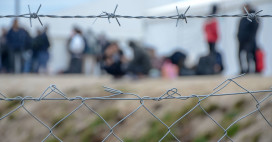
Adrian Lupa was forced to leave his home and partner in the United Kingdom after a European Arrest Warrant – an increasingly popular tool intended for serious crime and used throughout the European Union – was issued for his arrest and jailing in Romania for stealing a €20 pair of trousers in 2011.
Judicial authorities in the UK, with their well-established reputation for blocking the surrender of people to other EU member states where prison conditions were judged inhumane, had received promises and written assurances by Romania that conditions in his prison would be of an acceptable standard.
But those assurances were not honoured, according to Adrian. In his testimony, he said:
“All 10 of us were kept in a small room, which was probably fit for only one person. The water was not fit for drinking and had rust in it. The others used a piece of cloth to filter the water in order to drink it. There was one toilet for all 10 of us.”
“The walls were mouldy, and the smell was unbearable. I was sick at one point and I was not given medicine and I was not seen by a doctor. There were fights in the room and another person who was extradited from Italy, committed suicide because he could not cope anymore,” Adrian’s testimony continues.
Adrian is not alone. The assurances weren’t honoured for others who gave testimony about prison conditions before the Westminster Magistrates’ Court in August 2016, in the case of Timis County Court (Romania) v. Daniel Nicolae Rusu.
This was a landmark case that challenged Rusu’s surrender to Romania, for smuggling alcohol and related tax evasion, based on poor prison conditions, as well as previous breaches of assurances given by Romanian judicial authorities.
The court heard evidence from 11 people who had served time in Romania after being extradited from the UK. All of them told harrowing stories of inhumane prison conditions and said that assurances made by Romania had not been respected. As a result, the Court refused Rusu’s extradition, and he was ultimately released.
The court had ruled that Romania could not be trusted to honour the assurances given to British Courts that prisoners extradited from the UK would not be subjected to poor prison conditions that would impair their rights under Article 3 of the European Convention on Human Rights, which prohibits torture, and “inhuman or degrading treatment or punishment”.


